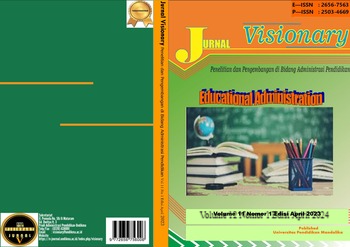Implementasi Kebijakan Penerimaan Peserta Didik Baru di SDN Ibu Dewi 1 Melalui Pendekatan Filsafat Pragmatis
DOI:
https://doi.org/10.33394/vis.v12i1.10606Abstract
Abstract : Abstract: This study examines the implementation of new student admission policies at SDN Ibu Dewi 1 through a pragmatic philosophical approach. The primary objective of this system is to achieve equitable educational quality, yet it often faces challenges and conflicts, such as restrictions on school choices and impacts on student profiles, classroom availability, and school performance. A qualitative method was employed to collect data through interviews, field observations, and literature studies. The conclusions of this study provide insights into how SDN Ibu Dewi 1 effectively manages the New Student Admission Process (PPDB), overcoming challenges related to capacity and zoning policies, and ensuring the quality of education. By applying the principles of pragmatism, this research highlights the importance of a problem-based approach, critical reflection, and practical consequence-based evaluation to enhance teaching and administrative practices in schools.
Key Words: Policy Implementation, Pragmatic Philosophy, Educational Policy
Abstrak : Penelitian ini mengkaji implementasi kebijakan penerimaan peserta didik baru di SDN Ibu Dewi 1 melalui pendekatan filsafat pragmatis. Tujuan utama sistem ini adalah mewujudkan pemerataan kualitas pendidikan, namun seringkali menghadapi tantangan dan konflik, seperti pembatasan pilihan sekolah dan dampak pada profil siswa, ketersediaan ruang kelas, serta prestasi sekolah. Metode kualitatif digunakan untuk mengumpulkan data melalui wawancara, observasi lapangan, dan studi kepustakaan. Kesimpulan dari penelitian ini memberikan wawasan tentang bagaimana SDN Ibu Dewi 1 mengelola PPDB dengan efektif, mengatasi tantangan kapasitas dan kebijakan zonasi, serta menjamin kualitas pendidikan. Dengan menerapkan prinsip-prinsip pragmatisme, penelitian ini menunjukkan pentingnya pendekatan berbasis masalah, refleksi kritis, dan evaluasi berdasarkan konsekuensi praktis untuk meningkatkan praktik pengajaran dan administrasi sekolah.
Kata Kunci: Implementasi Kebijakan, Filsafat Pragmatisme, kebijakan Pendidikan
References
Anwar, S., & Umam, H. (2020). Transformative Education: Emphasizing 21st Century Skills and Competencies in The Independent Learning Curriculum. AIM: Journal of Islamic Education Management, 1(1), 1–16.
Burhanudin, M. (2017). he Roles Of Principals In Increasing Education Quality By Developing Teacher Profesionalism. Didaktika Religia, 5(1). https://doi.org/10.30762/didaktika.v5i1.856
Daulay, H. P. (2014). Pendidikan Islam dalam Perspektif Filsafat. Jakarta: Kencana.
Dewey, J. (1964). Democracy and Education (IV). New York: The Macmillan Company.
Hasbullah, M. (2015). Kebijakan Pendidikan dalam Perspektif Teori, Aplikasi dan Kondisi Objektif di Indonesia. Depok: Raja Grafindo.
Kaffa, Z., Budi, S. S., & Gistituati, N. (2021). Kebijakan Penerapan Sistem Zonasi. Jurnal Pendidikan Tambusai, 5(1), 1870–1879.
Miles, M. B., Huberman, A. M., & Saldana, J. (2014). Qualitative Data Analysis, A Methods Sourcebook. London: SAGE Publications, Inc.
Nugroho, R. (2023). Public Policy 7: Dinamika Kebijakan Publik, Analisis Kebijakan Publik, Manajemen Politik Kebijakan Publik, Etika Kebijakan Publik. PT Elex Media Komputindo.
Prasetyaningrum, A., & Marmoah, S. (2022). Analisis SWOT Manajemen Peserta Didik dalam Penerimaan Peserta Didik Baru di Sekolah Negeri. Jurnal Basicedu, 6(4), 5598–5604.
Sugiyono. (2016). Metode Penelitian pendidikan. Bandung: Alfabeta.
Sugiyono. (2021). Metode Penelitian Pendidikan (Kuantitatif, Kualitatif, Kombinasi, R & D dan Penelitian Pendidikan (5 ed.). Alfabeta.
Suparlan, H. (2015). Filsafat pendidikan Ki Hadjar Dewantara dan sumbangannya bagi pendidikan Indonesia. Jurnal filsafat, 25(1), 56–74.
Wulandari, D. (2018). Pengaruh penerimaan peserta didik baru melalui sistem zonasi terhadap prestasi belajar siswa kelas VII di SMPN 1 Labuhan Ratu Lampung Timur tahun pelajaran 2017/2018.
Downloads
Published
How to Cite
Issue
Section
Citation Check
License
Authors who publish with this journal agree to the following terms:
- Authors retain copyright and grant the journal right of first publication with the work simultaneously licensed under a Creative Commons Attribution License (CC BY-SA 4.0) that allows others to share the work with an acknowledgment of the work's authorship and initial publication in this journal.Â
- Authors are able to enter into separate, additional contractual arrangements for the non-exclusive distribution of the journal's published version of the work (e.g., post it to an institutional repository or publish it in a book), with an acknowledgment of its initial publication in this journal.
- Authors are permitted and encouraged to post their work online (e.g., in institutional repositories or on their website) prior to and during the submission process, as it can lead to productive exchanges, as well as earlier and greater citation of published work (See The Effect of Open Access).
Â






